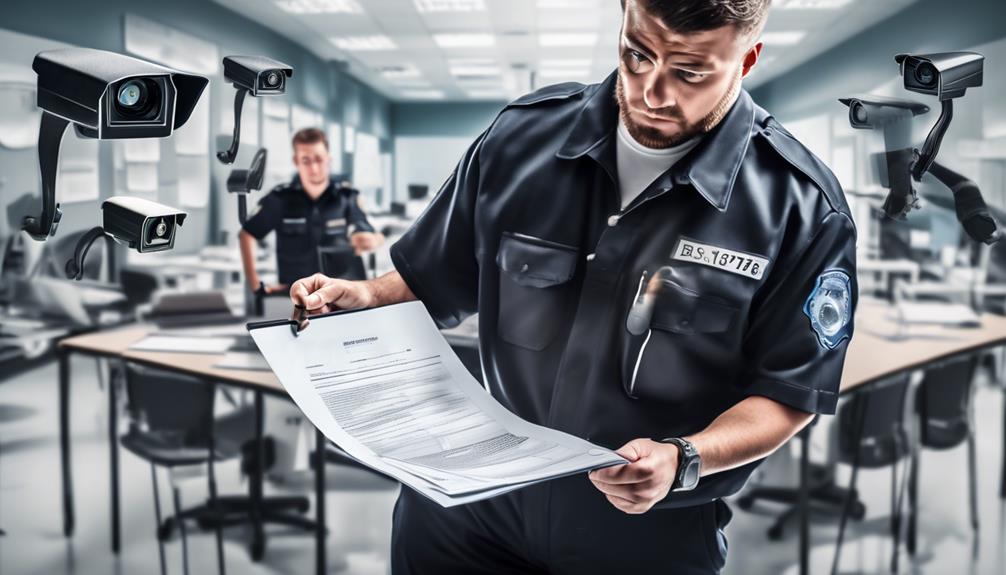When it comes to navigating the landscape of security positions, there is a significant factor that demands attention: understanding the implications of BS7858. This standard holds a weighty influence on the security sector, shaping the caliber of professionals entrusted with safeguarding vital assets.
By grasping the nuances of BS7858, you can fortify your organization against potential risks and bolster its defenses. Dive into the key insights that will equip you with the knowledge needed to navigate the intricate realm of security roles effectively.
BS7858 Overview for Security Roles
When considering security roles, understanding the BS7858 screening requirements is essential for ensuring industry compliance and client trust. The BS7858 regulation updates in 2019 brought crucial changes, emphasizing annual screening and risk assessment.
This expanded definition of screening includes personal identity verification, employment history verification, government watchlist and sanctions checks, criminal record checks, and financial integrity assessments. One specific component introduced in the 2019 update is the Watchlist Check, which cross-references individuals against databases to ensure they aren’t flagged for criminal activities.
Document verification plays a vital role in validating identity through critical documents. The Security Industry Authority (SIA) is integral in enforcing BS7858 screening requirements, with SIA cards being necessary for roles like security guards, CCTV operators, and those handling sensitive data.
Key Requirements for BS7858 Vetting
Understanding the key requirements for BS7858 vetting is crucial for maintaining industry compliance and ensuring trust in security positions. To comply with BS7858, you must adhere to specific vetting standards. Here are the key requirements:
- Personal Identity Verification: Confirming the identity of the individual through official documents.
- Employment History Verification: Validating the candidate’s work experience and references.
- Government Watchlist Checks: Screening individuals against government watchlists for any concerning affiliations.
Impact of BS7858 on Security Positions
The implementation of BS7858 standards significantly influences the roles and responsibilities within security positions. With the updated regulations in 2019, security professionals now undergo annual screening that includes specific checks like personal identity verification, government watchlist screenings, and financial integrity assessments. These changes aim to ensure that individuals in security roles are not flagged for criminal activities and have their identities thoroughly validated.
To grasp the impact of BS7858 on security positions, consider the following table:
| Impact of BS7858 on Security Positions | Description |
|---|---|
| Annual Screening | Security professionals undergo yearly screenings to maintain compliance and reduce risks. |
| Specific Checks | Checks like identity verification and watchlist screenings enhance the thoroughness of vetting processes. |
| Public Trust and Industry Integrity | Authentication of SIA cards against the SIA register ensures trust and integrity within the security industry. |
| Culture of Safety | BS7858 fosters a culture of safety, integrity, and trust among security personnel. |
These changes not only enhance security measures but also contribute to building a more trustworthy and competent security workforce.
Best Practices for BS7858 Compliance
Given the impact of BS7858 on security positions, maintaining best practices for compliance is essential to uphold industry standards and ensure a trustworthy workforce. To help you navigate the complexities of BS7858 compliance effectively, here are some best practices to consider:
- Regular Training: Ensure all staff involved in the screening process receive regular training on the latest BS7858 requirements and compliance procedures to stay up-to-date and proficient in their roles.
- Thorough Documentation: Keep meticulous records of all screening processes and outcomes, including personal identity verification, employment history checks, criminal record validations, watchlist screenings, and document verifications, to demonstrate compliance and due diligence.
- Continuous Monitoring: Implement a system for ongoing monitoring of employees to promptly identify any changes in their status that may affect their BS7858 compliance, such as new criminal offenses or discrepancies in their employment history.
Conclusion
In conclusion, understanding the impact of BS7858 on security positions is essential for maintaining a secure work environment.
By staying updated on regulations, focusing on specific screening checks, recognizing the importance of SIA in security roles, and implementing best practices for compliance, companies can ensure enhanced security, compliance, and quality of hires.
Following these tips will help navigate the BS7858 screening process effectively and mitigate the risk of hiring dishonest employees.



